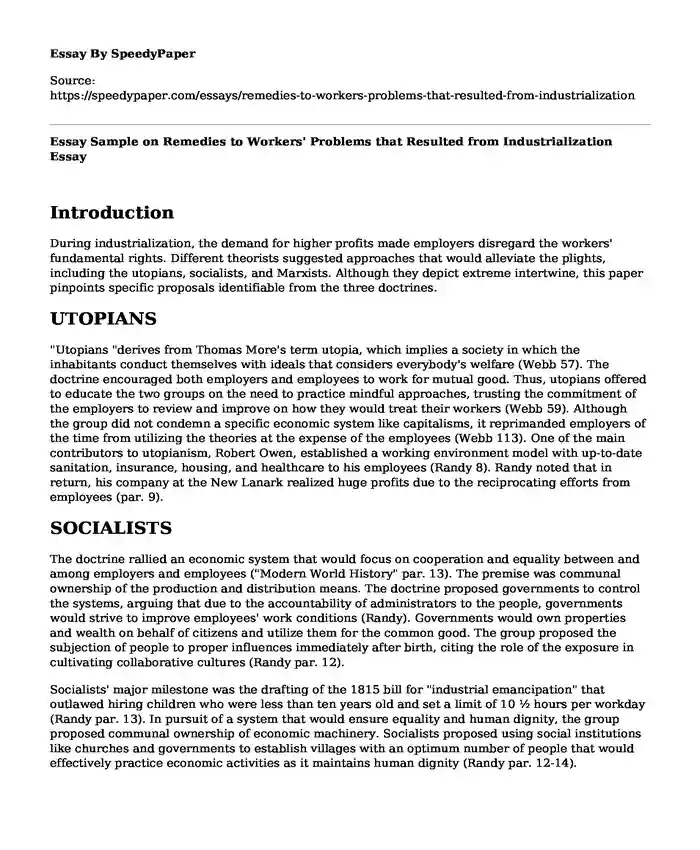
| Type of paper: | Essay |
| Categories: | Economics Employment |
| Pages: | 3 |
| Wordcount: | 575 words |
Introduction
During industrialization, the demand for higher profits made employers disregard the workers' fundamental rights. Different theorists suggested approaches that would alleviate the plights, including the utopians, socialists, and Marxists. Although they depict extreme intertwine, this paper pinpoints specific proposals identifiable from the three doctrines.
UTOPIANS
"Utopians "derives from Thomas More's term utopia, which implies a society in which the inhabitants conduct themselves with ideals that considers everybody's welfare (Webb 57). The doctrine encouraged both employers and employees to work for mutual good. Thus, utopians offered to educate the two groups on the need to practice mindful approaches, trusting the commitment of the employers to review and improve on how they would treat their workers (Webb 59). Although the group did not condemn a specific economic system like capitalisms, it reprimanded employers of the time from utilizing the theories at the expense of the employees (Webb 113). One of the main contributors to utopianism, Robert Owen, established a working environment model with up-to-date sanitation, insurance, housing, and healthcare to his employees (Randy 8). Randy noted that in return, his company at the New Lanark realized huge profits due to the reciprocating efforts from employees (par. 9).
SOCIALISTS
The doctrine rallied an economic system that would focus on cooperation and equality between and among employers and employees ("Modern World History" par. 13). The premise was communal ownership of the production and distribution means. The doctrine proposed governments to control the systems, arguing that due to the accountability of administrators to the people, governments would strive to improve employees' work conditions (Randy). Governments would own properties and wealth on behalf of citizens and utilize them for the common good. The group proposed the subjection of people to proper influences immediately after birth, citing the role of the exposure in cultivating collaborative cultures (Randy par. 12).
Socialists' major milestone was the drafting of the 1815 bill for "industrial emancipation" that outlawed hiring children who were less than ten years old and set a limit of 10 ½ hours per workday (Randy par. 13). In pursuit of a system that would ensure equality and human dignity, the group proposed communal ownership of economic machinery. Socialists proposed using social institutions like churches and governments to establish villages with an optimum number of people that would effectively practice economic activities as it maintains human dignity (Randy par. 12-14).
MARXISM
Marxism derives from the philosopher Karl Marx, whose concepts rely on a socioeconomic interpretation of historical materialism that would help understand the relationships between different classes of people in the economy (Webb 3). The doctrine indicated that the struggle between the bourgeoisie and the proletariat was the leading cause of the capitalist economy that suppresses the latter. Marx believed that the battles between the two groups would only be eliminated by economic and social revolution, which will lead to the replacement of the private possession of production means by the collective ownership under communism (Webb 31-33). Randy acknowledges the philosopher's hint on the progressive growth of societies through a series of economic stages, from feudalism to capitalism and ultimately communism (par. 26). The group suggested creating communities that would focus on ensuring dignified working conditions for all types of workers regardless of their age, race, or gender ("Modern World History" par. 13).
Works Cited
"Modern World History." Webs, (n.d), https://webs.bcp.org/sites/vcleary/ModernWorldHistoryTextbook/IndustrialRevolution/responsestoIR.html. Accessed 22 September 2020.
Randy, Alfred. "Industrial Utopian Robert Owen Born." Wired, https://www.wired.com/2010/05/0514robert-owen-born/. Accessed 22 September 2020.
Webb, Darren. Marx, Marxism, and Utopia. Routledge, 2019.
Cite this page
Essay Sample on Remedies to Workers' Problems that Resulted from Industrialization. (2023, Dec 24). Retrieved from https://speedypaper.net/essays/remedies-to-workers-problems-that-resulted-from-industrialization
Request Removal
If you are the original author of this essay and no longer wish to have it published on the SpeedyPaper website, please click below to request its removal:
- Essay Sample Describing the Organizational Structure of the Teamsters
- Free Essay Example on Pattern of Ownership
- Free Essay Dedicated to the Origin, Development, and Impact of Early Agriculture
- Essay Sample on The Effectiveness of the US Sugar Tariff Rate Quota
- Agribusiness: Understanding Climatic Dependence & Seasonality - Essay Sample
- Free Paper on Pros and Cons of Compensation and its Effect on Employee Behaviors
- Free Paper Example on Employee Discrimination
Popular categories




